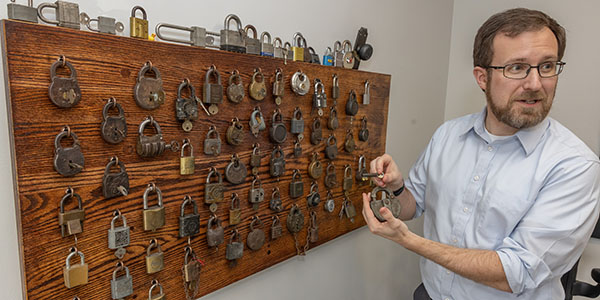For Miami VP, challenging hobby about more than picking locks
David Seidl’s passion for locksport connects him to colleagues, family, and more

For Miami VP, challenging hobby about more than picking locks
After nearly 15 years of partaking in locksport, the hobby of overcoming locking systems, David Seidl quickly points out he isn’t much better at it now than he was when he started.
What locksport has done for Seidl, though, is open figurative doors. Picking locks has helped Miami University’s vice president for information technology engage with students, forge new relationships, and strengthen the feeling of connection with his late grandfather, who worked as a locksmith.
“There are now hundreds of people who have heard about my grandfather,” said Seidl, who also serves as Miami’s chief information officer. “His lock collection has started more conversations for me than any other thing in the world of Zoom and online meetings.”
That collection, which resides in Seidl’s Hoyt Hall office in Oxford, also laid the groundwork for a recent article for EDUCAUSE, a nonprofit that works to advance higher education through the use of information technology. Seidl collaborated with John O’Brien, president of EDUCAUSE, to pen “Lockpicking Lessons for Leaders,” an article that explores how lessons learned from their shared enthusiasm for locksport also apply to leadership.
After Seidl joined the EDUCAUSE board of directors, he and O’Brien soon met for a one-on-one Zoom call. O’Brien had heard a lot about Seidl, but he was immediately intrigued, and felt a sort of kinship, when he virtually saw the collection of locks visible in the background of Seidl’s Miami office.
“I sort of gasped in that way you do when you stumble on to someone who shares the same quirky, weird hobby you have,” O’Brien said. “It was a great conversation from there.”
Like with Seidl, lockpicking is a hobby for O’Brien. But, locksport can also be extremely competitive. Seidl noted an active YouTube community with prolific and talented lockpickers. He likened it to watching an Olympic swimmer go from one end of the pool and back.
“I don’t think I could get there without wading and flailing,” Seidl joked.
“Locksport is a good conversation starter. It’s a way to build a bridge. I started off thinking I was going to enjoy the lockpicking aspect of it for the challenge and the skillset, but I really enjoyed the way people engage with me about it more.”
Seidl has around 80 locks in his collection, most of which came from his grandfather, Louie Krofft. He has other locks, too, including gifts from friends and family and even an industrial Master Lock found on the side of the road.
Seidl plucked the lock from the grass, took it back to his office, and picked it in around 15-20 minutes.
There is another lock in his collection that Seidl has never been able to get open. It’s one he may never be able to master.
“I don’t feel compelled to pick it,” Seidl said. “I leave it on the wall. Maybe one day the university locksmith will swing by and open it, or it might just stay there the rest of my life and not get picked. And that’s OK, too.
“Sometimes the goal may be different than what you think it was when you started doing the thing. If you can find happiness and joy, it doesn’t always have to be more than that.”
O’Brien takes a similar approach. He sees locksport as a bit of a metaphor for life.
“Slow down. Break the problem down into steps and then work the problem,” O’Brien said. “I think I do my best problem-solving with a lock in hand. And it’s fun!”